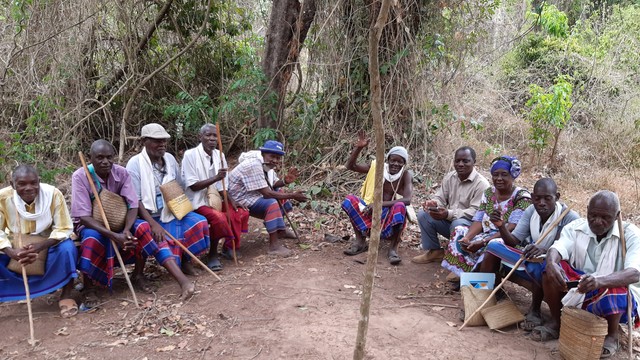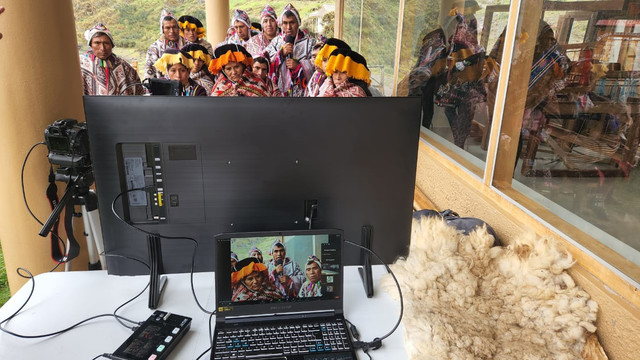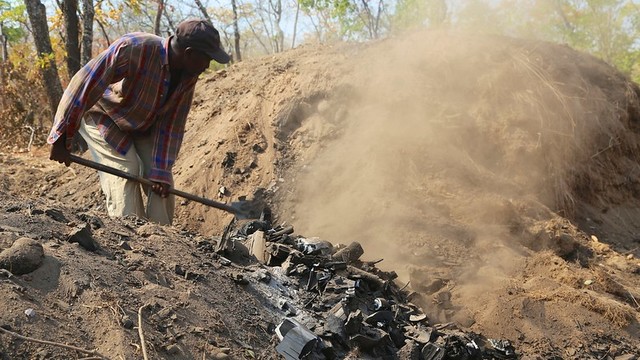Indigenous people use own knowledge to boost food yields despite climate change, research finds
New research shows how indigenous communities are fine-tuning traditional knowledge to mitigate the risks of climate change.

IIED's Krystyna Swiderska discusses the latest research on how indigenous people adapt to climate change at a side event at the 2016 UN climate conference in Marrakech (Photo: Teresa Corcoran/IIED)
Latest findings from research by IIED and partners shows how indigenous people are using traditional knowledge to counter growing threats to food security in the face of climate change.
Droughts, floods, heat stress and other extreme weather can heavily impact food production, while more subtle changes such as sporadic hot and cold spells or incremental temperature increases can be equally detrimental to the quality and quantity of yields.
Indigenous communities, often living in fragile environments such as semi-arid, dryland or mountain areas, are particularly exposed to the risks of climate change.
But the latest evidence from the Smallholder for resilience (SIFOR) project, presented last week at a side event at the UN climate conference (COP22), shows how new innovations based on traditional knowledge and crops of indigenous communities in Peru, China, India and Kenya, are not only helping to maintain yields but actually increasing production.
- In coastal Kenya, for example, farmers found that planting pruned cassava tops increased production by up to five times, while planting coconuts face-down avoided infestations of termites that can ruin yields. Deep-ploughing manure improved soil fertility, also leading to high productivity
- By crossing modern and traditional varieties, farmers in the Indian Himalayas are breeding new high-yielding varieties of radish, while changing sowing times, planting depth and weeding methods has dramatically increased the yield of onions, cauliflower and gaderi (a root vegetable)
- In the Potato Park, Peru, diversifying native potato varieties and testing them across the collectively managed landscape has enabled communities to increase yields despite serious pest infestations due to soil warming. Household incomes have also doubled in 10 years thanks to collective micro-enterprises such as eco-tourism and crafts stemming from biocultural products and services, and
- In Southwest China, maize participatory plant breeding that links scientists with traditional farmers has increased yields by 15 to 30 per cent, increased resilience to drought and pests, and conserved hundreds of landraces. Links with urban ecological restaurants have tripled farm incomes and revitalised agroecological practices.
Balancing science with traditional knowledge
The Paris Agreement recognises the value of indigenous knowledge, stating that action to adapt to climate change "should be based on the best available science and, as appropriate, traditional knowledge, knowledge of indigenous peoples and local knowledge systems".
But Nationally Determined Contributions (NDCs), the national climate change action plans underpinning the Paris deal, are heavily weighted towards science, with very few mentioning indigenous knowledge at all.
According to Krystyna Swiderska, principal researcher in IIED's Natural Resources research group, who leads the SIFOR project, science has an important role in the food policy discourse and in building climate change resilience. But it must align with traditional production systems, which have developed over centuries to maximise productivity over time by spreading risk.
"Agricultural research and extension often focuses on pumping out high-tech drought-tolerant or pest-resistant crops, seen in national policies as the best way to adapt to the impacts of climate change," said Swiderska. "But the spread of monocultures is eroding local crop diversity and related knowledge that provide vital options for future adaptation, and can increase risk in the face of growing climatic variability."
Permanent platform for indigenous expertise
The failure to recognise indigenous knowledge in NDCs calls for much greater participation of indigenous peoples in national and sub-national climate change policy discourse to ensure traditional knowledge is heard and incorporated into countries' adaptation plans.
Swiderska said: "National climate processes in developing countries often engage scientists, overlooking indigenous people. These groups must also be recognised as technical experts in the policy discussion on climate change adaptation. The UNFCCC must make good on its commitment to establish an Indigenous Peoples' Platform as a permanent body where indigenous people can share their traditional knowledge and innovations as part of the global climate change policy process.
Swiderska: Because a lot of traditional knowledge isn't written down, it's aural, this means we are facing a double-extinction event #COP22 https://t.co/NaGsDI3Zku
— IIED (@IIED) November 11, 2016
"The knowledge of indigenous communities is not a static body of knowledge. These people, and the generations before them, have lived in harsh environments for hundreds of years. They are highly adaptive and have shown how they continually fine-tune knowledge to manage risk and maximise food productivity," she added.
"These latest findings from the SIFOR project are hard evidence of how traditional knowledge can be used by indigenous communities to tackle the challenges of climate change."
More information:
- SIFOR China baseline study: Smallholder farming systems in Southwest China: exploring key trends and innovations for resilience, Y Song, Y Zhang, X Song, K Swiderska (2016), IIED Country Report
- SIFOR Peru baseline study: Resilient farming systems in times of uncertainty: biocultural innovations in the Potato Park, Peru, Asociación ANDES (2016), IIED Country Report
- Biocultural Heritage website: www.bioculturalheritage.org
Teresa Corcoran (teresa.corcoran@iied.org) is content officer in IIED's Communications Group.
Contact
Krystyna Swiderska (krystyna.swiderska@iied.org), principal researcher (agriculture and biodiversity), IIED's Natural Resources research group



